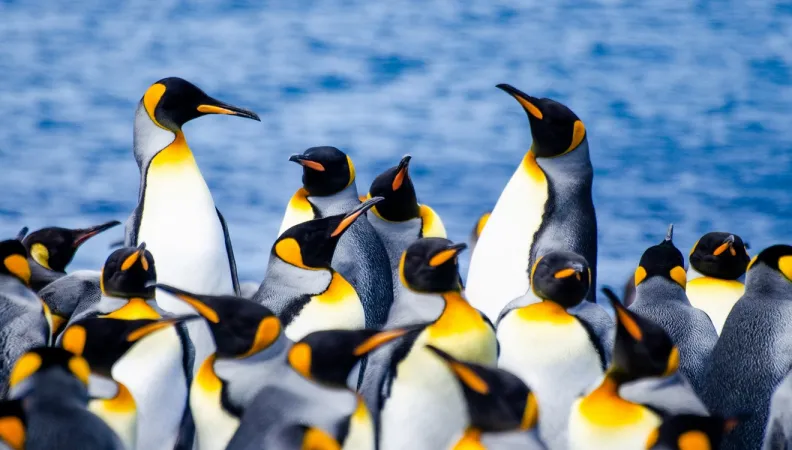Share the page
Nature's Laboratories for Climate change: How the EU and AFD are protecting the Planet’s Poles
Published on

The first-ever international summit on glaciers and the poles, held in Paris this month, shed light on the role played by the planet’s extreme regions in regulating the climate and preserving biodiversity. From the Tropics to the Antarctic, we take a closer look at these remote areas, which are open-air laboratories for how the planet is enduring the effects of climate change.
The French Southern and Antarctic Lands (TAAF) are not permanently inhabited, and there is little exploitation of their marine resources. But their marine ecosystems are important for the planet’s wellbeing – and are under threat from climate change, illegal fishing and increased maritime traffic. "The anticipated disappearance of glaciers, the proliferation of invasive alien species, the weakening of coral ecosystems and the erosion of the coastline are examples of the range of impacts investigated and factored into our management responses," says Franck Lustenberger, TAAF Director of the Environment. "These territories are exceptional sites for biodiversity, which raise issues of preserving ecosystems that are unique on an international scale".
Further reading: 5 good reasons for (finally) paying attention to the oceans
Via AFD, France champions biodiversity and climate
France and the European Union have launched an initiative to counter the degradation of the Indian Ocean in particular. Sponsored by the EU via a grant delegated to AFD, the Restoring Indian Ocean Island Ecosystems Project has three major objectives:
- Improve ecosystem monitoring and observation (such as through bio-indicators and environmental monitoring)
- Develop collaborative ecosystem restoration projects (e.g. eradication of invasive terrestrial alien species)
- Prevent or reduce damage to ecosystems, particularly through biosafety measures
"With the TAAFs, we are developing a unique partnership at AFD Group level, says Patricia Aubras, AFD Regional Director for the Indian Ocean. “While promoting research and exchanges of experience between peers…this partnership will continue with more interactions at regional level on the knowledge and preservation of fishery resources and remote ecosystems".
AFD also supports the TAAFs in developing their Territorial Climate-Air-Energy Plan (PCAET), a tool that sets local authority objectives in terms of combating climate change and energy transitions. With funding from the Fonds Outre-mer (Overseas Fund), the TAAFs will be able to assess their vulnerability to climate change and greenhouse gas emissions and draw up a plan of programmed actions. They will then monitor these actions with target indicators (including photovoltaics to replace thermal generators and drinking water treatment units to reduce imported plastic water bottles for example).
Research, a vital tool for territories at the climate crossroads
With its extension announced in February 2022 during the One Ocean Summit, the French Southern Territories Nature Reserve, comprising the territories of the sub-Antarctic zone, has grown to 1.6 million km², becoming the largest marine protected area in France and the second largest in the world.
An Overseas territorial authority with neither a permanent population nor elected representatives has its administrative headquarters on Reunion Island.
Owing to their location at latitudes with extreme climate conditions, their low level of human settlement and the diversity of their marine and land resources, the TAAFs are ideal natural laboratories for studying changes on the planet and the major environmental and scientific challenges facing the region. Permanent atmospheric monitoring facilities for the southern hemisphere located on Amsterdam Island have provided valuable data, not least for the IPCC.
In 2022, Ifremer was supported by AFD in launching an exceptional oceanographic mission combining scientific research and educational teaching: the École bleue Outre-mer (Overseas Blue School). Like a floating university, the Marion Dufresne (France's largest oceanographic vessel and supply ship to the southern territories, whose restoration was financed by AFD ten years ago) went to explore the seamounts and the Scattered Islands, with 50 students from seven Indian Ocean countries and 20 scientific supervisors on board. [Websites in French.]
The Call for research projects "Ecological connectivity to maximize biodiversity conservation between the Marine Protected Areas of the South-West Indian Ocean", which is currently ongoing, seeks to scale up the effectiveness of marine biodiversity conservation, particularly through research on connectivity of marine ecosystems and species. It is part of the scientific research support program for the Scattered Islands, announced by Emmanuel Macron during his visit to Grande Glorieuse in 2019.
This call for projects was led by France's National Research Agency (ANR) and research authorities in South Africa, Tanzania, Mozambique and Kenya. Supported by AFD, it was launched on September 19 and remains open until November 30, 2023.
